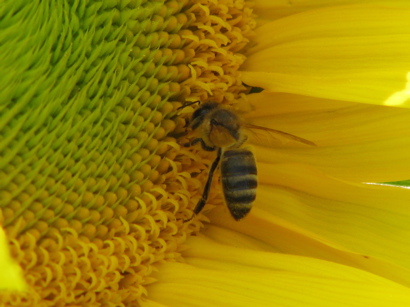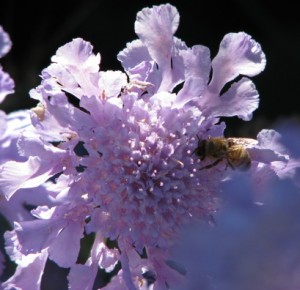About That Bee Book

As you know, I’ve had bees on my mind for weeks. I keep talking about Fruitless Fall: The Collapse of the Honey Bee and the Coming Agricultural Crisis, the book about bee colony collapse written by my former grad-school classmate, Rowan Jacobsen.
How much have you read about bee colony collapse?
I knew the honeybee’s numbers were declining. I remember hearing the wacky cell phone theory several years back, and that was laughed out of the news, and since then I’ve just heard ominous mutterings now and then about the bees disappearing and nobody knows why.
But I didn’t know the half of it.
I didn’t know, for example, that nowadays U.S. beekeepers earn most of their income—far more than they earn selling honey—trucking their hives around the country to pollinate crops. Somehow this gobsmacks me. We are dependent on migrant worker bees for the produce we grow in this country.
I definitely didn’t know that in the winter of 2006/2007, huge numbers of these hives began to die, and no one is sure exactly why. There are theories, which is a lot of what Rowan’s book is about: an in-depth and thoughtful exploration of what could possibly be causing the collapse of our bee colonies.
As I said above, when I heard about “the disappearance of the honeybee” I thought it meant declining numbers. Pesticides, I assumed (and indeed that seems to be a major factor). What I didn’t get was that bees literally disappeared. The hives died because the forager bees flew out and didn’t fly back home. There are diseases and pests that kill bees, and you find dead bees in and around the hive. (That’s happening too, in horrifying numbers.) But in other cases, the bees just up and disappeared. One possible explanation, Rowan learned, is a kind of disorientation and memory loss known to be a symptom of neurological damage caused by certain pesticides. It’s possible the bees are suffering from something like bee Alzheimer’s due to exposure to toxins meant to kill other insects. They fly off to work and can’t find their way back home. And in other hives, there are bees carrying every bee disease, fungus, and pest known to afflict the honeybee world—all at once. It’s as if their immune systems have been decimated (possible cause: the catastrophic wave of varroa mite infestation that arrived in this country a few years back and is a terrible scourge in many parts of the world right now), leaving them susceptible to other illnesses.
And it isn’t just the honeybees: we know a lot about the decline in their numbers because they are domesticated bees, owned by devoted beekeepers who know exactly how many hives they have lost to varroa and bee colony collapse. No one has good numbers on all the other pollinating insects out there, except it seems clear honeybees aren’t the only pollinators in decline. Did you know vanilla beans are hand-pollinated by humans? The insect pollinator has been wiped out.
 Obviously Fruitless Fall made a big impact on me. Shook me up; Jane too. The funny thing is, at the very same time that it was scaring the pants off me (a world short on pollinators is a scary, scary concept), it was filling me with wonder and delight. I know that sounds impossible. It’s the way Rowan looks so closely, with humor, warmth, and affection, at this ordinary (extraordinary!) creature, the honeybee. It reminded me of the John Stilgoe book I kept raving about last year, Outside Lies Magic. Remember that one? What Stilgoe did for me with power lines and telephone poles, Rowan Jacobsen did for me with bees and honey and even figs. The early chapters describing life in a beehive and the life cycle of the bee were so engaging that I read them aloud to 8-year-old Beanie, who was captivated. Jane (almost 14) has read the book at least three times now. She begged me to order Rowan’s book on chocolate—along with our very own copy of Fruitless Fall. Which is a good thing, because I find myself wanting to thrust the book at everyone I talk to. It’s that kind of book.
Obviously Fruitless Fall made a big impact on me. Shook me up; Jane too. The funny thing is, at the very same time that it was scaring the pants off me (a world short on pollinators is a scary, scary concept), it was filling me with wonder and delight. I know that sounds impossible. It’s the way Rowan looks so closely, with humor, warmth, and affection, at this ordinary (extraordinary!) creature, the honeybee. It reminded me of the John Stilgoe book I kept raving about last year, Outside Lies Magic. Remember that one? What Stilgoe did for me with power lines and telephone poles, Rowan Jacobsen did for me with bees and honey and even figs. The early chapters describing life in a beehive and the life cycle of the bee were so engaging that I read them aloud to 8-year-old Beanie, who was captivated. Jane (almost 14) has read the book at least three times now. She begged me to order Rowan’s book on chocolate—along with our very own copy of Fruitless Fall. Which is a good thing, because I find myself wanting to thrust the book at everyone I talk to. It’s that kind of book.
bee colony collapse, bees, Fruitless Fall, honeybees, John Stilgoe, Outside Lies Magic, Rowan Jacobsen


lickona says:
Well, we’re buying a copy…
On May 13, 2009 at 9:07 pm
Shonda says:
I will check it out! I find dead bees on my patio all the time. It’s unsettling.
On May 13, 2009 at 9:53 pm
Kay says:
Yes, I have become obsessed with the Bees too since you first wrote about Fruitless Fall. I had no clue about this.
I have since talked to “our” local naturalist at the county park and working to put together a Teen environmental/science class. First book on the agenda… of course, Fruitless Fall.
Oh.. that makes me think ….. I found this site I wanted to share with you. You’ve lead us on so many great paths.
http://www.waldenplay.com
I’m planning to produce this play as a fundraiser for a Youth Group that is traveling to Waldens Pond in April 2010.
Our kids have been in theatre for the past three years and it has been a fantastic experience for them.
My hope is to bring Walden, The Ballad of Thoreau, to varies schools, churches and other interested groups in the area and promote youth theatre too.
On May 14, 2009 at 3:25 am
Beth says:
The bees are like frogs: harbingers. It is terrifying, what we’ve done to this planet. On the hopeful side, we are a brilliant people; we can fix this, given time. I think. I hope. If we have enough time.
I’ve known there was a wild hive of big, fat bumblers somewhere near my backyard for a few years now — I posted a photo of a giant bumblebee on my bleeding heart the other day — anyway: I found it! (The hive). It is under my compost bin. I was thrilled to discover it.
On May 14, 2009 at 8:05 am
Sarah says:
I started reading Outside Lies Magic last week– after re-reading your tidal homeschooling posts. 🙂 Now I’ve got another to add to the list…
On May 14, 2009 at 8:45 am
RecollectedStephanie says:
Lissa, just so you know … my husband works at a place that makes apple juice. (Really good apple juice – premium stuff that’s only available seasonally.) He says that the bee man is okay this year. It’s been very scary lately, but things are recovering. Apparently. Things are apparently recovering.
He’s still carting migrant pollinators all over the place, but the bees are happy and busy and plentiful again. I was relieved to hear it. Not having them around very much is as eerie as having the skies silent on that terrible day in September, you know? It’s not a good silence.
On May 14, 2009 at 10:23 am
Elizabeth says:
It’s things like this that remind me that we so often have no idea where/how our food in the shops comes from.
Did he mention that it’s because the Australian bees are still doing fairly well that we should hopefully be ok for the next few years? They ship their bees by the hundreds of thousands to America to help out with the pollination. Let’s hope the Australians can keep the diseases at bay.
On May 14, 2009 at 11:29 am
Peg says:
I’ve been reading about the bees for a few years. And praying.
It seems like the bees are too fragile to be trekked around the country. I’ve heard that local beekeepers are not losing as many, but I don’t know if that is true.
The bats on the East Coast are another mystery.
On May 14, 2009 at 12:30 pm
Eileen Smithdeal says:
A very dear friend of mine sent me Rowan’s book and I am thoroughly enjoying it! This post is so wonderful. I love the way you write! and what an outstanding photo!!!
On May 14, 2009 at 7:47 pm
nina says:
Just commenting to say thanks. The book will go on my long list. Are there suggestions for the common person to take to help the bee population?
On May 15, 2009 at 10:13 am
Melissa Wiley says:
Kay, thanks for the link. Neato!
Elizabeth, he does discuss the Australian bees. Isn’t it mindblowing to think this is necessary? Importing honeybees from the other side of the world in order to ensure our hives stay alive and functioning? What staggered me so much about the book was the realization that we are so very dependent on these domesticated bees. I knew beekeepers kept bees for honey. I guess I figured crops were pollinated by wild bees and other insects. I didn’t know our agricultural industry had so many eggs in the honeybee’s basket.
On May 15, 2009 at 12:32 pm
Melissa Wiley says:
Stephanie, that is reassuring news. Thanks for sharing it.
Peg, I just heard about the bats! Scott sent me a link the other day. I’ll try to find it.
On May 15, 2009 at 12:33 pm
Elizabeth says:
Nina-We can all most definitly help–at least we can help get the wild bees flourishing again. Grow as many flowering plants, especially those with more than one flower per branch. Buy organic, grow your own–anything to cut out how many chemicals are used by mass produced food. Buy from farmers who are diversified and plant different crops throughout the year–they will flower at different times, keeping the wild bees busy and fed. We can all do so much–if every property has some flowers throughout the year–that alone would be a huge help.
On May 15, 2009 at 2:17 pm
Lenetta @ Nettacow says:
Just wanted to let you know I linked to this on my weekly link roundup. And added that title to my “to be read” pile, which is about the size of yours. (sigh.) Hubs’s grandfather had bees at one time on our farm, and I’m hoping that in the next few years, perhaps we can give it a shot.
On May 16, 2009 at 1:13 pm